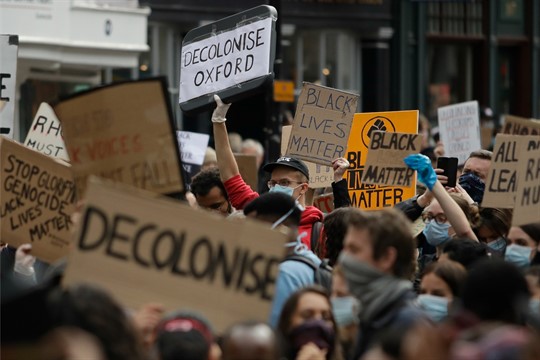It was the last day of class for DEV-130: Why Are So Many Countries Poor, Volatile and Unequal. As I disconnected from Zoom, I sat back in my chair, stared at my computer screen and a deep sense of disappointment washed over me. I was disappointed because I felt invisible. My history and my very existence as a person of color was completely ignored in the teaching of neoclassical economic theories.
As an African American who has lived in East Africa for nearly 14 years, I was dismayed that neither slavery nor colonialism was mentioned as the class sought to explain the great economic divide between wealthy and poor countries. I was puzzled. How could we possibly laud 80 years of the Industrial Revolution in Europe and the US, without even mentioning the 300 years of free labor that was afforded to these countries through slavery? What value would there have been in the invention of a cotton gin, if the 12 million slaves taken from Africa weren’t there to pick the raw materials for free?
How could we discuss the “Malthusian trap,” without critically acknowledging the economic trap set for African countries in the negotiating of post-colonial economic policies, such as the French Colonial Tax, which required former French colonies to pay tax to France on all exported products.
These are not just matters of the past. Still today, Francophone African countries pay $500 billion in colonial taxes to France each year. France, in turn, is recognized for its generosity, when giving a mere $12.2 billion annually in development assistance to Africa. It doesn’t take a seasoned economist to see the inherent racism within neoclassical economic theories and current-day economies. So, why are we still teaching these theories without correcting for their racial bias?
As Harvard University reckons with its own racialized past, it must go a step further to critically dismantle what we accept as established theories and challenge what is not being taught in the classroom. Harvard must not be afraid to acknowledge that neoclassical economic theories are racially biased, nor should the elite scholars within this ivory-tower shy away from acknowledging these truths. As a community, we must question which historical scholars’ voices and perspectives are being amplified, and which voices and perspectives are being overlooked. Moreover, we must ask how erasure in the curriculum and invisibility in the classroom perpetuates structural racism and inequality.
As Professor Ronald Heifetz’s theory on adaptive leadership teaches, Harvard must do the adaptive work to acknowledge systemic racism within its curriculum. As a leader in academia, Harvard should exercise leadership from the inside out and do its own adaptive work to shift mindsets and belief systems in greater academia. Part of doing the adaptive work requires conducting a curriculum review of all Harvard courses to make sure they possess the consciousness and rigor to contribute to the building of an anti-racist, anti-colonial world. Harvard has the responsibility to lead the decolonization of academia, starting with DEV-130.
I should note that this is not a discredit to Professor Hausmann, whose brilliance is unmistakable. Rather, this is a general critique of curriculums that do not acknowledge the impact of racial inequality on modern society and economics. This is a call for Harvard to give voice to students of color, who like me, continue to feel invisible in the classrooms of American colleges and universities, and to decolonize its curriculum.
The word “decolonize” to some may sound radical, but it’s not. The idea of decolonization is an acknowledgement that colonial structures have largely shaped modern culture, politics, and economics. It recognizes Adam Smith as the ‘Father of Economics’ based on his 1776 book, The Wealth of Nations, where he emphasized the importance of production specialization, which ultimately led to the expansion of the slave trade to increase the wealth of nations during the 18th and 19th centuries.
Decolonization gives voice to perspectives that are marginalized in mainstream narratives. It is the “intentional undoing – unlearning and dismantling (of) unjust practices, assumptions and institutions”. It is a “process of deconstructing colonial ideologies of the superiority and privilege of Western thought and approaches”.
Harvard, fortunately, has an abundance of scholars who have already begun to do this work. While cultural taxation in academia is a real thing, we need to call on these scholars and recruit others to form a curriculum review board, and ensure that all Harvard classes promote diverse perspectives and champion the unlearning of systemic racism. We must task Harvard with establishing a collective pedagogical consciousness that promotes anti-racism and anti-colonialism in institutional policy, practice, and pedagogy, and fosters collaboration between scholars who are, for lack of a better word, woke – and those still in need of an awakening.
Editor’s Note: This piece has been edited at the request of the writer to more accurately reflect Adam Smith’s proposals on slave trade.
Author’s Note: The modern-day “French Colonial Tax” is not an official tax but is a figurative term used to summarize the amount of money that France makes as a result of the continued post-colonial monetary policy, which pegs the CFA franc to the Euro and requires African countries to keep their reserves in the French Treasury. The $500B figure is the stated estimate of how much France makes through forex trading, interest on reserves, preferential access to African markets, and subsidies on natural resources including oil, diamonds, and uranium. This preferential access is afforded to both the French government and to French private companies.
